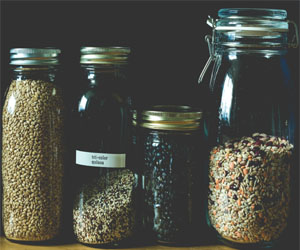


Nourishing Your Body And Soul

Cooking for health is not just about preparing meals to satisfy your hunger; it's an art and science that can transform your life. The food choices you make and how you prepare them have a profound impact on your physical well-being and mental health. In this article, we'll explore the importance of cooking for health and share some practical tips to help you embark on a journey to a more vibrant and balanced life.
The Relationship Between Food And Health
The saying, "You are what you eat," holds a profound truth. The foods you consume provide the raw materials your body needs to function correctly. A well-balanced and nutritious diet is the foundation of good health. Cooking for health allows you to control the quality of the ingredients, the cooking methods, and portion sizes, which can significantly impact your overall well-being.
Benefits Of Cooking For Health
Nutrient Control: When you cook your meals, you have control over the ingredients, ensuring that your dishes are rich in essential nutrients like vitamins, minerals, and antioxidants.
Portion Control: Cooking at home allows you to manage portion sizes, reducing the risk of overeating and promoting weight management.
Reduced Processed Foods: Preparing your meals minimizes reliance on processed foods, which often contain excessive salt, sugar, and unhealthy fats.
Better Food Choices: Cooking for health encourages the use of whole, unprocessed ingredients and a variety of fruits, vegetables, lean proteins, and whole grains.
Customization: You can tailor your meals to accommodate dietary restrictions, allergies, or specific health goals.
Practical Tips For Cooking For Health
Plan Your Meals: Start with meal planning. Create a weekly menu that includes a variety of foods to ensure you get a wide range of nutrients.
Shop Mindfully: When grocery shopping, stick to your list and avoid impulse purchases. Focus on fresh, whole foods and limit processed items.
Balanced Plate: Aim for a balanced plate with a mix of lean proteins, vegetables, whole grains, and healthy fats. This helps provide a wide range of nutrients.
Cooking Methods: Choose healthy cooking methods like baking, grilling, steaming, and sautéing over deep-frying.
Use Herbs And Spices: Experiment with herbs and spices to add flavor to your dishes without relying on excessive salt, sugar, or unhealthy condiments.
Experiment With New Ingredients: Explore new foods and ingredients to keep your meals interesting and diverse.
Practice Mindful Eating: Slow down and savor your meals. Pay attention to your body's hunger and fullness cues.
Stay Hydrated: Don't forget to drink plenty of water throughout the day to stay well-hydrated.
Minimize Sugary Drinks: Cut back on sugary beverages and opt for water, herbal tea, or unsweetened options.
Enjoy The Process: Cooking should be enjoyable. Make it a mindful and creative experience that fosters a positive relationship with food.
Cooking for health is a powerful tool that empowers you to take control of your diet and, by extension, your overall well-being. By adopting mindful eating habits and making informed choices in the kitchen, you can embark on a journey to improved health and vitality. The kitchen becomes a place not only to create delicious meals but also to nourish your body and soul, promoting long-term health and happiness.
A Powerful Combination For Success
 Here's how gratitude can empower goal achievement and why it's worth incorporating into your daily life.
Here's how gratitude can empower goal achievement and why it's worth incorporating into your daily life.
Positive Mindset: Gratitude fosters a positive mindset by encouraging us to focus on the good in our lives. When we appreciate our current circumstances, we cultivate a sense of optimism and belief in the possibility of achieving our goals. This positive outlook can provide the mental energy and resilience needed to overcome challenges on the path to success.
Motivation And Energy: Practicing gratitude can boost motivation and energy levels. When we are grateful for what we have, we are more likely to approach our goals with enthusiasm and a sense of purpose. This motivation can drive us to take consistent action towards achieving our objectives.
Nurturing Wellness Through Unity
 Understanding The Mind-Body Connection
Understanding The Mind-Body Connection
The mind-body connection posits that our emotions, thoughts, and mental states can have a direct impact on our physical health. This interplay is a two-way street: not only do our physical health and conditions affect our mental well-being, but our mental state can also influence our physical health. For example, stress and anxiety can manifest in physical symptoms like tension, headaches, or digestive issues.
Impact On Health
Stress And Immunity: Chronic stress can weaken the immune system, making the body more susceptible to illness and disease. Stress reduction techniques can help boost immunity.
Pain Management: The mind can influence the perception of pain. Mind-body practices like meditation and relaxation techniques can help manage chronic pain.






A Journey To Better Health And Taste
 2. Fresh Fruits And Vegetables: At the heart of any diet based on wholesome ingredients are fresh fruits and vegetables. These colorful and nutrient-dense foods provide a wide array of vitamins and minerals, along with dietary fiber. Incorporating a variety of fruits and vegetables into your meals ensures you get a broad spectrum of nutrients.
2. Fresh Fruits And Vegetables: At the heart of any diet based on wholesome ingredients are fresh fruits and vegetables. These colorful and nutrient-dense foods provide a wide array of vitamins and minerals, along with dietary fiber. Incorporating a variety of fruits and vegetables into your meals ensures you get a broad spectrum of nutrients.
3. Whole Grains: Whole grains, such as brown rice, quinoa, oats, and whole wheat, are unrefined grains that retain all parts of the grain kernel. They are a rich source of fiber and provide a steady release of energy. Whole grains are a staple in a wholesome diet.
4. Lean Proteins: Lean proteins like chicken, turkey, fish, tofu, legumes, and low-fat dairy products are essential for muscle health and overall well-being. They are a primary source of amino acids necessary for the body's growth and repair.
5. Healthy Fats: Wholesome ingredients include healthy fats like avocados, nuts, seeds, and olive oil. These fats provide essential fatty acids that support various bodily functions, from brain health to skin and hair.
6. Natural Sweeteners: When sweetness is desired, wholesome ingredients offer natural sweeteners such as honey, maple syrup, and dates. They provide a sweet taste without the refined sugars often found in processed foods.
7. Minimal Processing: Wholesome ingredients are as close to their natural state as possible. They have undergone minimal processing and do not contain artificial additives or preservatives. This ensures that the nutrients and flavors are retained.
Your Journey To Well-Being
 Emotional Well-Being: It enhances emotional stability and fosters a positive outlook on life.
Emotional Well-Being: It enhances emotional stability and fosters a positive outlook on life.
Improved Relationships: People with inner peace tend to have healthier relationships and better communication skills.
Mental Clarity: A peaceful mind allows for better decision-making and problem-solving.
Enhanced Physical Health: Inner peace can reduce the risk of physical ailments caused by stress and emotional turmoil.
The Journey To Inner Peace
Finding inner peace and balance is an ongoing journey, and it involves the following steps:
Self-Reflection: Take time to explore your inner self, your thoughts, and emotions. Understand your triggers and patterns.
Mindfulness: Practice mindfulness techniques, such as meditation and deep breathing exercises. These help you stay present in the moment and reduce mental clutter.
Letting Go: Learn to let go of things you cannot control and detach from negative emotions that do not serve you.
Gratitude: Develop a habit of expressing gratitude daily, focusing on the positive aspects of your life.
Nurturing Well-Being With Nature's Fragrances
 The Essence Of Aromatherapy
The Essence Of Aromatherapy
Aromatherapy, with its roots dating back to ancient civilizations, is founded on the principle that our sense of smell is intrinsically connected to the brain's limbic system, which governs our emotions, memory, and mood. Essential oils, extracted from various parts of plants, are rich in aromatic compounds that can influence our psychological and physiological states.
Physical Balance
Aromatherapy can promote physical balance through essential oils that alleviate discomfort and encourage relaxation. Oils like lavender, chamomile, and eucalyptus are known for their soothing properties. Lavender, for instance, can reduce stress, improve sleep quality, and ease muscle tension. Incorporating these oils into massages or baths can significantly impact our physical well-being.
Emotional Harmony
Our emotional well-being is closely linked to our overall balance in life. Aromatherapy can help restore emotional equilibrium by reducing anxiety, uplifting the spirits, and fostering emotional balance. Essential oils like citrus, rose, and ylang-ylang have mood-enhancing properties. Diffusing these oils in our living spaces or incorporating them into self-care rituals can create a more positive emotional environment.
Mental Clarity
Mental balance is equally important for a balanced life. Aromatherapy can enhance mental clarity, reduce stress, and improve focus. Oils like peppermint and rosemary are well-known for their cognitive-enhancing properties. Diffusing these oils in workspaces or using them during meditation practices can create an environment conducive to a balanced and focused mind.
Holistic Approach To Balance
Aromatherapy is a holistic approach to achieving balance. It recognizes the interconnectedness of physical, emotional, and mental well-being and offers a versatile and natural means to address these interconnected aspects of our lives. By incorporating essential oils into daily routines, such as through massages, baths, inhalation, or diffusion, individuals can embark on a holistic journey toward a more balanced and harmonious life.
A Key To Heart Health And Overall Well-Being
 The Importance Of Cardiovascular Fitness
The Importance Of Cardiovascular Fitness
Heart Health: Cardiovascular fitness directly impacts heart health. Regular aerobic exercise strengthens the heart muscle, making it more efficient at pumping blood and reducing the risk of heart disease.
Improved Circulation: As cardiovascular fitness improves, blood vessels become more efficient at carrying oxygen-rich blood throughout the body. This can reduce the risk of high blood pressure and improve overall circulation.
Weight Management: Engaging in cardiovascular exercise helps burn calories, aiding in weight management and reducing the risk of obesity.
Enhanced Endurance: Improved cardiovascular fitness leads to increased endurance, making everyday tasks easier and reducing fatigue during physical activities.
Mental Well-Being: Cardiovascular exercise releases endorphins, which can improve mood, reduce stress, and enhance cognitive function.
Ways To Improve Cardiovascular Fitness
Aerobic Exercise: Engage in aerobic activities such as running, swimming, cycling, brisk walking, and dancing. Aim for at least 150 minutes of moderate-intensity aerobic exercise or 75 minutes of high-intensity aerobic exercise each week.